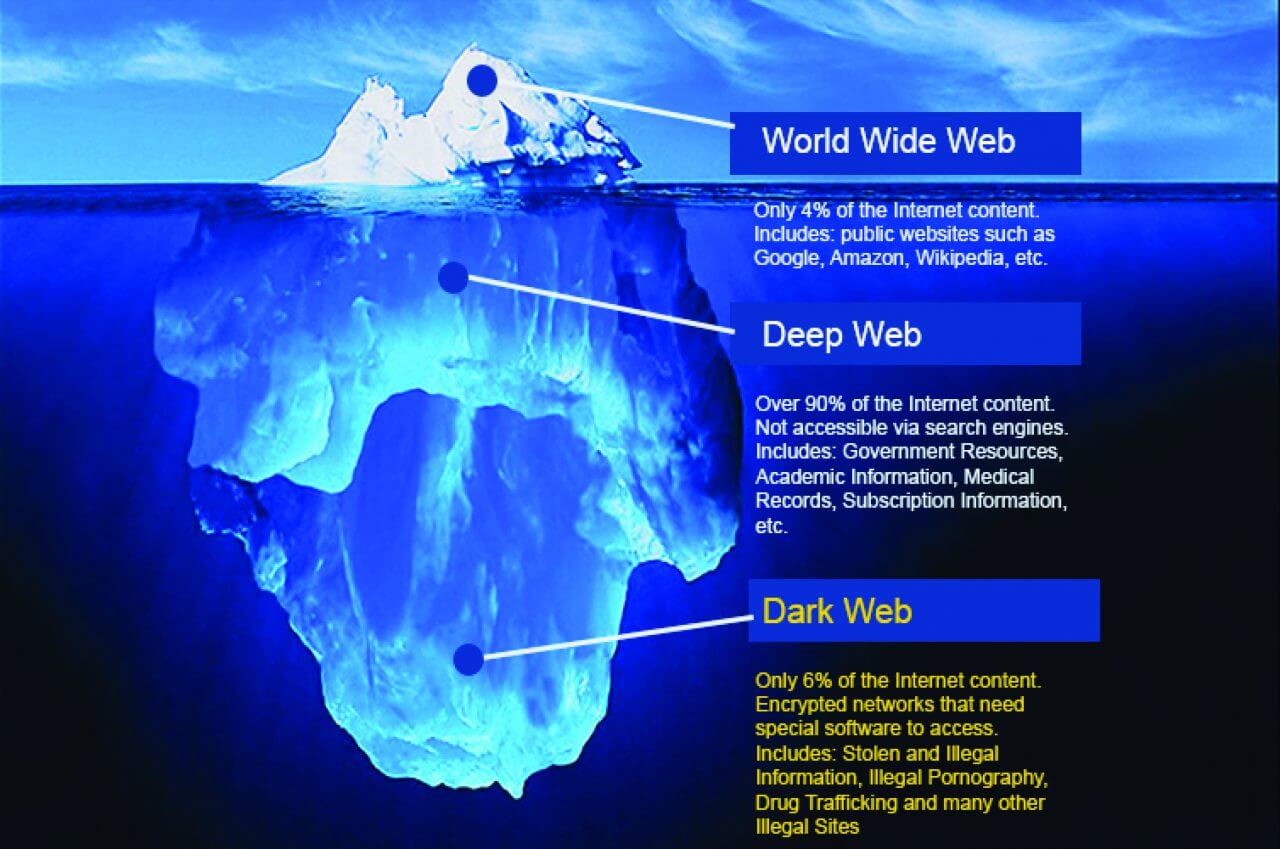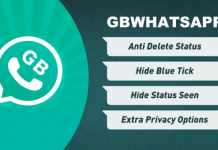Have you ever heard the words ‘dark net’ tossed around and wondered what they mean? Well, how about you pull your chair close so we can have this chat in detail.
When you hop on the internet, the first thing you do is type in some words on Google (or your favorite search engine) and get results-plenty of them. The results you got are from the World Wide Web which is the top layer of the internet (let’s call it the clear web).
All information on the World Wide Web is public and therefore accessible to everyone. Sadly (or luckily, depends on how you look at it), the clear web accounts for a measly 4% of the internet’s content.
The second layer of the internet is called the deep web and almost 90% of it is not accessible through search engines. Deep web consists of government resources, subscription data, medical records, academic research data…you get the drill, right?
The last layer of the internet is so hidden away from the public which is why it’s called the dark web. The data hidden here includes illegal pornography, illegal or stolen information, militia operations, government secrets, drug trafficking and all other ills you can think of that are illegal.
To make it simple, the dark web is the underworld where all the secrets are kept. Still wanna sail? Good. The captain is ready so strap yourselves in.
Deep web vs. dark web: what’s the difference?

Although the deep web data is not indexed by search engines, that does not mean there is something spooky happening there. In fact, the deep web is merely a safe house for things like scientific white papers, PayPal and other companies’ data, army communication, medical records, tax info…etc.
All the content on the deep web is made private courtesy of HTTPS forms. This means there is either a paywall or password which renders them inaccessible.
What exactly happens on the dark web?
Many sites conduct illicit activities like trading or manufacturing illegal drugs. The high level of privacy offered by the dark web provides ideal conditions for political dissidents or pro-democrats, hired hitmen, human traffickers, child pornography, and a host of other unethical practices.
We are not saying you are a bad person for wanting to access the deep web. Remember, it’s the only place you can express your opinions freely without losing your anonymity. Maybe you are running from a terror attack, or are afraid a potential employer might want to track your social media discussions.
The problem is, with so many covert operations taking place on the dark web, it’s very easy to wander off into unquestionable content. And when that happens and sadly you lose privacy, you could land in very big trouble.
The dark is an unstable environment where websites keep coming up, shifting places, and going out-all within a very short time. People do this to avoid tracking by the police (and sometimes unhappy clients). If you decide to wade into the deepest darkest net, the next section might be of importance to you.
Steps to accessing the dark web
The dark web is no longer reserved for criminals, police detectives, and hackers. Ordinary netizens too can access it as well. So how is that possible? The answer is simple – Tor browser
Unlike Google or any other search engine, that takes you straight to the search results, Tor uses a bunch of encrypted servers (nodes or relays) which essentially obfuscate your IP and personal details. They do this by bouncing your IP from one relay center to another. Since their volunteer relays are all over the world, it makes it hard for enemies to trace you.
Transitioning from a non-private resource to a private one can attract questions from authorities. So before you make the world aware of your Tor download, first fire up a VPN or proceed with the download via your browser’s incognito mode. Oh, one more thing, get it from Tor’s official site to avoid downloading spyware or malware.
If you don’t have any security walls in place, you can go ahead to download Tor but strap a duct tape over the webcam for extra privacy. You never know who’s peeping.
Tor is not enough
Sorry to burst your happy bubble but there is usually nothing like foolproof privacy online. If someone is on your tracks and is well funded, they can find you. How? Well Tor’s IP is public and while websites you are visiting and your ISP cannot track you, it will still be apparent that someone is ‘Tor-ing’ and that raises trackers’ suspicion.
To avoid drawing unwanted suspicion, you need an additional VPN layer. Optionally, you could go with Tor Bridges (Tor’s private relays) for safe touring of the internet’s underworld.
Despite coming off as the top browsing choice always, Tor has a couple of shortcomings. First, the performance can be so lousy since there are tunnels to go through. Secondly, because of privacy issues, this browser triggers the bot hunting tools quite often. So be ready to deal with captcha challenges. Lastly, it can be quite a hurdle to fire it up. Thankfully, there are many YouTube tutorials to rely on.
We know the mighty ‘‘T (h) or,’’ is more than capable. However, if you might be interested to know that there are other effective browsers for peeping into the dark lanes of the dark web. Excellent examples include I2P, Orbot, Comodo Ice Dragon, Orbot, Matrix.org, FreeNet, and Globus Secure Browser.
Dark web search engines

We already said that Google, Bing, Yahoo, and other commonly known search engines cannot get you to the dark web. This is because their addresses are not indexed and besides that, they don’t end in typical ‘‘.com’’ or ‘‘.org’’. Instead, most end in ‘‘.onion.’’
This means you need to research search engines designed for the dark web sails. A few golden choices include Ahmia, NotEvil, Dark.fail, Torch, Candle, DuckDuckGo
Threats existing on the dark web
If you decide to use the dark web, you could be vulnerable to a host of unpleasantness beyond losing your privacy. First, you could encounter ransomware that steals your data and threatens to expose it all over the dark net if you fail to pony up the ransom.
Secondly, you can lose precious personal, customer, operational, or business that could amount to further fraud incidences and possible business failure. If you are connected to company computers, a DDOS attack could cripple all the core computer resources putting a stop to large-scale operations.
Thirdly, should you lose direction and end up clicking on items under 24/7 surveillance like firearms, PayPal hacks, porn, or real fake passports, you could end up spending cold nights behind bars.
Tips on staying safe on the dark web
Because much of the content existing on the dark net is highly illegal, trouble is likely to come uninvited. Here are a few tips that will keep your neck above water while browsing the deepest depths of the internet:
Some people put in so much effort in ensuring they remain untraceable until they send someone their personal email, financial info, and other personally identifiable data. If you must exchange info, sign up for untraceable emails (forget Gmail and Yahoo).
Channels that supply untraceable emails include TORbox, Mail2Tor, Bitmessage, Riseup, ProtonMail, and many others.

- Use updated Tor browser
Tor developers always try their best to give their users the best layer of privacy. But like any other online software, their browser too faces occasional bugs and weaknesses. So always ensure you are on their latest version to minimize security breaches.
- Don’t enable scripts
There are sites that need JavaScript and other macros to run better. A good example is YouTube. However, while exploring the dark net, enabling scripts could result in a malware or spyware attack.
- Be wary of those downloads
Downloads act as hosts to spyware, malware, and other keylogging tools. Sadly, you won’t realize until it’s too late. To keep your PC and data safe, try using virtual machines to store downloads until you can verify their safety.
- Don’t buy anything
One of the best pieces of advice we can leave you with is this; stop buying things on the dark web. One, most of them are scams. If not then they are legit and offer shipping services which could lead to your identity being exposed. The same happens if you use your true financial info.
If you ever decide to buy anything, then use cryptocurrencies such as Bitcoin and Monero. Ah, and make sure not to use your home address or any place where you can be found easily should investigations crop up. But our stance remains the same; whatever good thing or insane offer you come across, just look-don’t buy.
Over to you
The long rant is finally over and we hope you now know what the dark web is and how to access it. If this is something you’ll be doing often, then you must change your mindset about the safety of the internet. Stop imagining all is okay. Trust no one.
Also, the dark net is not a place to make friends or business partners. If you are interested in creating meaningful relations, go check out Facebook, Linked In, and other social media sites.



